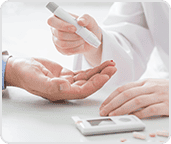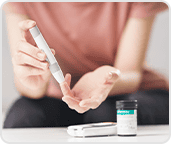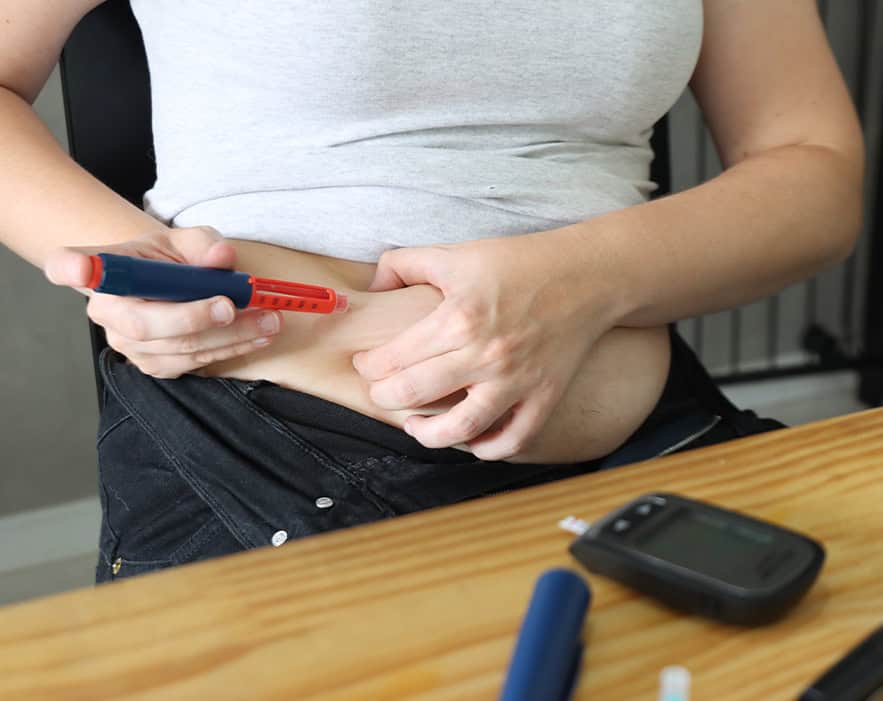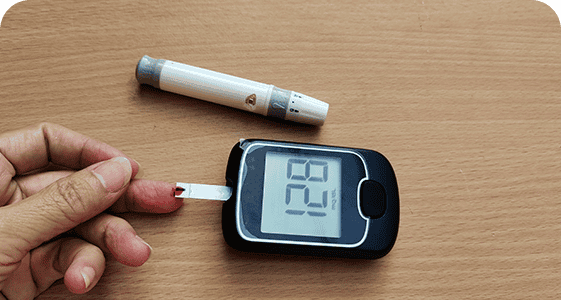
TYPE 1 DIABETES
This type of diabetes occurs when the immune system mistakenly attacks and destroys the insulin-producing cells in the pancreas.

TYPE 2 DIABETES
Type 2 diabetes is primarily caused by insulin resistance, where the body's cells become less responsive to insulin.
Diabetes Treatment in Edgemoor, DE
Of all the things the human body is compared to, plants may mimic its processes the best. For plants to thrive, they require a precise balance of sunlight, nutrients, and water. Any imbalance can weaken the plant and cause it to wither. Even when plants have the perfect balance of nutrients, external factors can still hinder their growth. For instance, pesticides in the roots can limit nutrient distribution and impact the plant's health.
Similarly, our bodies rely on proper nutrients to function optimally. When your body doesn't get the nutrients it needs, such as sugar molecules, cells lack the energy needed for proper function and health. This is evident in diabetics and pre-diabetics, where metabolic breakdown inhibits the production of cellular energy, leading to insufficient energy for healing.
If you're reading this page and have diabetes, have you ever wondered why you feel tired all the time and why wounds take so long to heal? It's due to the lack of cellular energy (ATP) your body requires. Your cells go into a starvation mode of sorts, limiting their ability to heal, repair, and regenerate. This can result in common diabetic complications such as neuropathy, retinopathy, and kidney disease.
At Kennedy Health, our team of doctors and experts is committed to treating diabetes - both Type 1 and Type 2. Unlike other clinics, however, we take a unique approach to diabetes treatment by correcting the root cause of the disease.

Kennedy Health: Your Partner for Comprehensive Diabetes Management in Edgemoor, DE
Kennedy Health is proud to be your partner in comprehensive diabetes care. Our focus goes beyond traditional diabetes treatments, aiming to provide you with holistic treatments that restore your health and enhance your quality of life.
Our patients have experienced remarkable improvements in their diabetes symptoms, including:
- Diminished Neuropathy
- Restored Erectile Dysfunction
- Prevented Amputations
- Controlled Weight
- Restored Energy
- Improved Mood
- Better Sleep
- Accelerated Wound Healing
- Controlled Blood Sugar
- Reduced Fatty Liver
- Much More

What Makes Kennedy Health a Unique Diabetes Clinic in Edgemoor, DE?

The Road to Recovery Starts with a Consultation
In the course of your consultation, which usually spans 30 to 60 minutes, our committed medical team will examine your records, medical background, and physical condition. If needed, we might ask for recent blood work. This data is essential for developing your personalized care plan. During this initial consultation, we'll answer all your questions and address any concerns you have. That way, you're confident and well-informed about diabetes treatment from Kennedy Health.

Collaboration with Your Doctor
At Kennedy Health, we never try to fill the important role that your primary care physician fills. Instead, our approach complements your doctor's expertise by working in tandem to co-manage your diabetes care plan. In fact, we prioritize collaboration with your doctor, encompassing treatment, testing, and sharing clinical results. Our unique treatment plans use insulin as a hormone instead of a drug, which distinguishes us from traditional providers. When necessary, we're more than willing to consult with your doctor and provide them with comprehensive information about our approach.

Personalized Diabetes Care Plans
We understand that each patient's insulin resistance and carbohydrate metabolism is unique. That's why we begin our care plans with a consultation to determine medical necessity. Once that's established, your personalized plan will usually involve an "Induction Phase" with weekly infusions that decrease gradually as you make progress over about 90 days. The "Maintenance Phase" focuses on optimizing metabolism and increasing the time between treatments. As you continue to make progress, the time between visits gets longer, and visit duration decreases, making it easier and more convenient to maintain your wellbeing.

The Physiological Insulin Resensitization Treatment Plan
Our groundbreaking approach is known as Physiological Insulin Resensitization. This multi-patented approach involves administering insulin as a hormone rather than a mere drug. This innovative method addresses the root cause of diabetes - metabolic failure. By mimicking the body's natural physiology, we effectively reduce insulin resistance, aiding blood sugar in entering cells for energy conversion. This increased cellular energy facilitates the growth, repair, and regeneration of damaged tissues and organs. This approach has shown the potential to stabilize and even reverse complications associated with diabetes and other metabolic disorders.
If you're in search of a comprehensive treatment for diabetes in Edgemoor, DE that goes beyond conventional methods, Kennedy Health can help. A new life free of neuropathy and other diabetes-related symptoms starts with a call to our office to schedule a consultation. You can rely on our expertise, commitment, and innovative approach as we guide you toward restored health, enhanced wellbeing, and a better quality of life.
Understanding the Types of Diabetes
Getting a diabetes diagnosis means that your body is having difficulty managing blood glucose (sugar) levels due to ineffective insulin production and distribution by the pancreas. After you eat, your body breaks down food into glucose, which your cells use for energy. The insulin your body makes helps to transport the glucose from your blood into your cells. If you have Type 1 or Type 2 diabetes, your body may not produce enough insulin, may be unable to use insulin effectively, or may have both issues, causing blood glucose levels to increase higher than normal. When blood glucose levels are higher than normal, it's referred to as hyperglycemia.
Now that you understand the basics of diabetes, let's take a closer look at the types of diabetes that can manifest in your body.

Pre-Diabetes
Pre-diabetes is a condition in which blood glucose levels are higher than normal but not high enough to be diagnosed as diabetes. It's associated with an increased risk of complications such as stroke and heart attack, as well as a higher likelihood of developing Type 2 diabetes. It's estimated that approximately 37% of adult Americans have pre-diabetes. Making lifestyle changes such as weight loss, adopting a healthier diet, and increasing physical activity may help in preventing or delaying a Type 2 diabetes diagnosis.

Type 1 Diabetes
Type 1 Diabetes can manifest at any age but is generally first identified in young individuals. It affects approximately 5% of people in the U.S. and is less prevalent than Type 2 diabetes. In Type 1 diabetes, the body's immune system targets and destroys the insulin-producing cells in the pancreas. As a result of the pancreas being unable to produce sufficient insulin, the standard treatment for Type 1 involves regular insulin injections, often multiple times a day.

Type 2 Diabetes
Type 2 diabetes is a progressive condition that develops when the pancreas is unable to produce enough insulin to maintain normal blood glucose levels. Treatment for Type 2 diabetes typically involves lifestyle modifications, oral medication, and insulin. As the condition progresses, some individuals may find that dietary and exercise changes are no longer sufficient to manage blood glucose levels, necessitating the addition of medications (oral and/or insulin) to their treatment plan.
Living a Normal Life with Diabetes is Possible at Kennedy Health
When you have Type 1 or Type 2 diabetes, your life changes. That's especially true for people suffering from Type 2 diabetes. These patients can experience harmful and debilitating symptoms such as neuropathy, depression, and fatigue. Fortunately, with our revolutionary diabetes treatment in Edgemoor, DE, diabetics of all ages have a true shot at potentially stabilizing and, in some cases, eliminating diabetes complications.
Our goal is to target metabolic dysfunction - the principal cause of diabetes - rather than just improving your symptoms.
We do so by creating personalized care plans for every one of our diabetes patients, which focus on:
- Patient Education
- Wellness and Nutrition
- Hormone Optimization
- Weight Management
- Physiological Insulin Resensitization

Getting Smart on Food Can Improve Your Diabetes
If there's one thing that people with diabetes can agree on, it's that figuring out what to eat with diabetes can be challenging. The truth is that all foods raise blood sugar, but some foods cause less of a spike in blood sugar than others. Foods like avocados, berries, dark leafy greens, eggs, fish, whole grains, nuts, and seeds will have a milder impact on blood sugar compared to starchy vegetables, fruit juice, and refined carbohydrates. Opting for fresh fruit with natural sugars over fruit juice, which is often processed to remove fiber and may contain added sugars, is a better choice for managing blood sugar levels.
Unsure what to eat if you have diabetes? We've come up with the following list to give you some options that won't spike your blood sugar. Because as your diabetes doctor in Edgemoor, DE state, we believe that properly managing diabetes involves more than treating symptoms. Education and healthy living are crucial.

Berries
Berries are known to have lower sugar content and higher nutrient levels compared to many other fruits. They are low in carbohydrates and high in fiber and antioxidants, which are believed to have a positive effect on blood sugar levels and oxidative stress. Blackberries, in particular, are recognized as a low-carb, high-fiber fruit that is rich in vitamin C, vitamin K, and potassium. If fresh berries aren't available near you, frozen berries from the grocery store can be a suitable alternative. Before you dig in, be sure to check the nutrition label to avoid added sugars and chemicals.

Avocados
Avocados have a naturally low carbohydrate content and are an excellent source of healthy omega-3 fats and fiber. The beneficial fats and fiber found in avocados can improve sensitivity to insulin and slow down the absorption of sugar into your bloodstream, effectively helping to regulate blood sugar levels. This multipurpose fruit can be utilized in various ways: in guacamole, salads, sushi, on toast, or as a topping for eggs.

Eggs
Eggs are a highly versatile food that is low in carbs and high in protein. With that said, some individuals may have concerns about the cholesterol content in eggs. Managing cholesterol is important if you have diabetes, as both diabetes and high cholesterol are risk factors for heart disease. Nonetheless, studies indicate that eggs can be a component of a healthy diet for most people, including those with diabetes.
Eggs have a minimal impact on blood cholesterol levels when consumed as part of a heart-healthy diet that is low in saturated fat. Additionally, the protein in eggs helps you feel full without causing spikes in blood sugar levels. If you're planning on including more eggs in your diet, consider incorporating simple boiled eggs, egg salad, or well-seasoned scrambled eggs into your meals.

Leafy Greens
Your parents probably made you eat your veggies - especially your greens - when you were younger, and for good reason. Kale, broccoli, collard greens, and spinach are leafy greens with high nutritional value and are low in carbohydrates, sodium, and cholesterol. These veggies also provide vitamins A, C, and K. If you find it hard to stomach raw greens in salads or by themselves, you can add greens to soups, smoothies, scrambled eggs, and even pasta sauces.

Fish
If you're looking to cut out red meat from your diet, substituting it with fish is a great way to do so. Fish is also high in omega-3 fatty acids and is very high in protein. This combo can help regulate your blood sugar levels and help make you feel full after eating. Plus, the extra protein and fatty acids found in fish like salmon can boost insulin resistance without impacting your blood glucose levels.

Greek Yogurt
Greek yogurt is an excellent source of protein, which effectively regulates blood sugar and hunger cues. It's also a rich source of probiotics that can improve insulin sensitivity and gut health. As an added bonus, the calcium and vitamin D in yogurt actively support metabolic health, bone health, and blood glucose management. If you're hankering for something sweet, opt for frozen yogurt with fruit and wholesome ingredients.

Kennedy Health Pro Tip: If you're serious about sticking to a healthy diet but can't shake the urge to splurge, it's OK. You can allow yourself a little leeway. The key to not overdoing it is to swap your splurge ingredients with healthier options that won't spike your blood glucose levels. For instance, if you love carnitas, swap shredded pork and tortillas for shredded chicken and iceberg lettuce wraps. If you must have steak and mashed potatoes for dinner, swap a 6oz. portion of meat for 3 ounces and replace the potatoes with mashed cauliflower instead.
Healthy Eating is Only Part of the Equation
If you have type 1 or type 2 diabetes and find your glucose levels spiking because of poor food choices, Kennedy Health can help. When you visit our diabetes treatment center in Edgemoor, DE for care, you'll receive a personalized care plan that includes tips and guidance on healthy eating. When combined with advanced diabetes treatments like Physiological Insulin Resensitization, you have the potential to stabilize and even reverse complications associated with diabetes and other metabolic disorders.
Reclaim Your Life with Help from a Kennedy Health Diabetes Specialist in Edgemoor, DE

Did you know that as of May 2024, the CDC estimates that 11.6% of Americans - or 38.4 million people - have diabetes? That equates to about 14.7% of all adults. Those statistics are alarming and mean that if you don't have diabetes, someone you know probably does. At Kennedy Health, our mission is to help diabetes patients manage their disease in a healthy, effective manner. We don't accomplish that mission by treating the symptoms of diabetes.
Instead, our diabetes doctors offer comprehensive care and innovative treatments for the disease and its associated complications. We supplement that care with education, compassion, and healthy living, so that you can further improve your health through lifestyle changes.
Disclaimer:


Service Areas


 Request Appointment
Request Appointment Call Us 302-520-3969
Call Us 302-520-3969
